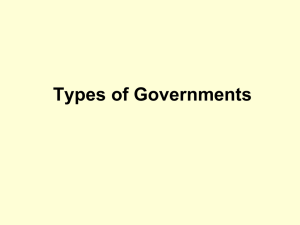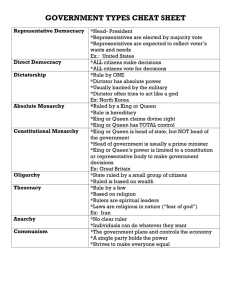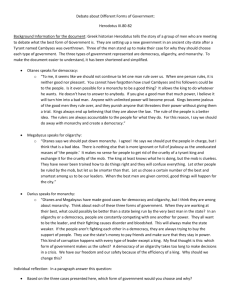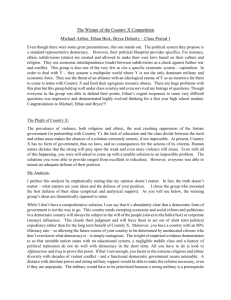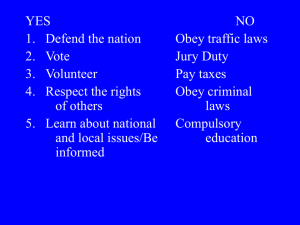Types of Government: Monarchy, Republic, Democracy
advertisement
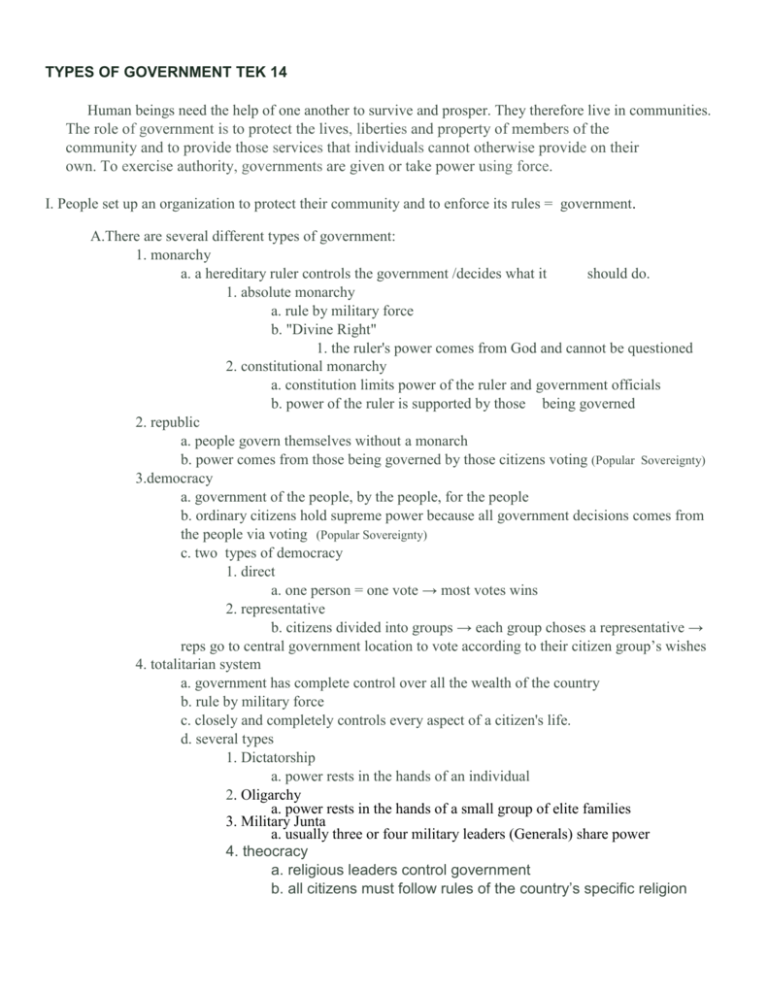
TYPES OF GOVERNMENT TEK 14 Human beings need the help of one another to survive and prosper. They therefore live in communities. The role of government is to protect the lives, liberties and property of members of the community and to provide those services that individuals cannot otherwise provide on their own. To exercise authority, governments are given or take power using force. I. People set up an organization to protect their community and to enforce its rules = government. A.There are several different types of government: 1. monarchy a. a hereditary ruler controls the government /decides what it should do. 1. absolute monarchy a. rule by military force b. "Divine Right" 1. the ruler's power comes from God and cannot be questioned 2. constitutional monarchy a. constitution limits power of the ruler and government officials b. power of the ruler is supported by those being governed 2. republic a. people govern themselves without a monarch b. power comes from those being governed by those citizens voting (Popular Sovereignty) 3.democracy a. government of the people, by the people, for the people b. ordinary citizens hold supreme power because all government decisions comes from the people via voting (Popular Sovereignty) c. two types of democracy 1. direct a. one person = one vote → most votes wins 2. representative b. citizens divided into groups → each group choses a representative → reps go to central government location to vote according to their citizen group’s wishes 4. totalitarian system a. government has complete control over all the wealth of the country b. rule by military force c. closely and completely controls every aspect of a citizen's life. d. several types 1. Dictatorship a. power rests in the hands of an individual 2. Oligarchy a. power rests in the hands of a small group of elite families 3. Military Junta a. usually three or four military leaders (Generals) share power 4. theocracy a. religious leaders control government b. all citizens must follow rules of the country’s specific religion TYPES OF GOVERNMENT MONARCHY Monarchy is probably the oldest form of government. The main characteristic of a monarchy is that the ruler inherits power. When the ruler dies, power automatically passes to one of the monarch's children or close relatives. Monarchs - kings, emperors, or sultans - fulfill their role as supreme ruler by surrounding themselves with followers and advisors who help them govern. RULE BY DIVINE RIGHT In older forms of monarchy, the king or queen claimed absolute power. Rulers often claimed to hold this power by "divine right," or the will of God. Ordinary people had no rights or freedoms, except those that the monarch allowed. CONSTITUTIONAL MONARCHY King Henry VIII of England was a monarch. In more recent times, monarchs have shared power with an elected legislature. Subjects of the monarch enjoy many traditional, protected rights. This system is known as a constitutional monarchy. Great Britain provides an example of a constitutional monarchy. Britain has a hereditary monarch and an elected House of Commons. The monarch serves as the symbolic head of state while elected members of Parliament govern the country. REPUBLIC When a society overturns its monarchy, it becomes a republic. A republic is simply a government without a king or queen. Often, the people in a republic choose representatives to make decisions. The United States, for example, is a republic. A republic might also be governed by a - group of hereditary nobles, such as the Republics of Venice and Genoa once were. Ghanaians celebrating 50 years of independence. In 1957, Ghana became the first sub-Saharan African country to gain independence from colonial rule. DEMOCRACY In a democracy, government authority is based on the will of the people. People either vote on issues directly, or they elect representatives who make government decisions for them. In a democracy, people also enjoy certain basic rights. This gives them the confidence to criticize the government freely. DIRECT DEMOCRACY The first known democracy arose in ancient Athens in the fifth century B.C. In fact, the very word democracy is Greek for "people-power." Citizens of ancient Athens assembled to make important decisions facing their city-state. They voted on these issues directly. This system is sometimes referred to as direct democracy. REPRESENTATIVE DEMOCRACY The Romans developed the first representative democracy. Different social groups elected their own representatives, who met in assemblies. The nobles were represented in the Senate. Governmental power was divided between these two branches and they voted on various issues. LATER DEMOCRACIES Later in history, various countries developed their own national assemblies. In England, land owners elected representatives to the House of Commons, one of the two chambers in the English Parliament. When the English set up colonies in North America, each colony had its own colonial legislature. After the United States became independent, it created an elected national law-making body, known as Congress. In the nineteenth century, several Latin American countries became democracies after achieving independence. Many countries in Europe became democratic after World War 1. After World War II, many countries in Africa and Asia established democracies when they attained their independence. DICTATORSHIP A dictatorship is a system of government in which a single person or small group exercises complete power over others. A dictator does not inherit power like a king. The dictator either seizes control by force, or is placed into a position of authority by others. In some countries, especially in Latin America and Africa, the military sometimes seized power and established a dictatorship. After achieving their independence, some African nations became one-party states in which some leaders became dictators. For example, Idi Amin Dada became a brutal military dictator while serving as President of Uganda from 1971 to 1979. In Zimbabwe, Robert Mugabe was elected to power. He quickly became a dictator who used police to block opponents from voting. Mugabe even arrested and tortured opponents. Dictators are free to do as they please, while other citizens in a dictatorship have few rights. Ordinary citizens in a dictatorship have very little influence over government policies. The main advantage of a dictatorship is that decisions can be made quickly. In ancient times, the Romans appointed a dictator when they were at war and needed strong leadership. When the war was over, the dictator was supposed to give up his power. In more recent times, dictators tend to hold on to power until they are overthrown. Dictators sometimes hold elections to obtain legitimacy for their government. An election victory may appear to justify the rule of the dictator, but in reality these elections are not truly free. People are afraid to criticize or oppose the dictator, and opposition parties are not permitted. TOTALITARIAN SYSTEMS Modem dictators, like Adolf Hitler in Germany, Joseph Stalin in the Soviet Union, and Saddam Hussein in Iraq, established totalitarian systems in which the government controlled all aspects of individual life. Under totalitarianism, people can only belong to organizations controlled by the government. No separate political parties, labor unions, or other organizations are allowed. The government either controls or prohibits all churches and religious groups. One leader or political party maintains total control over all aspects of society. This control extends to the police, military, communications, economy and the educational system. Adolf Hitler WWII Nazi Germany and Joseph Stalin in Russia The government also controls all television, radio, and newspapers. Government censorship prohibits all books or articles criticizing the government. All dissent is suppressed and citizens are terrorized by secret police. People who oppose the government are arrested and sent to labor camps or killed. The Supreme Leader of Iran, Ayatollah Ali Khamenei, rules Iran as a theocracy. THEOCRACY A theocracy is a government run by religious leaders. Like monarchy, theocracy is an old form of government. In a theocracy, the government claims to be directed by God, or divinely blessed. There is no legal separation between church and state, and citizens of other faiths are often excluded or expelled. In ancient times, rulers were often priests. The Pharaohs of ancient Egypt, for example, were believed to be gods. The Byzantine Empire was ruled by an emperor who was also head of the church. In the Middle Ages, the head of the Catholic Church, the Pope, ruled extensive territories in Italy. In early colonial times, Puritan ministers helped govern Massachusetts. Iran's Theocracy. More recently, Muslim religious leaders seized power in Iran in 1979. The Iranian Constitution emphasizes the importance of religion and Islamic law (Sharia). Today, Iran has both a theocratic and democratic government. Voters elect the President and representatives to the legislature. However, these officials remain subject to the control of Iran's religious leader - the head of state or Supreme Leader an Islamic cleric who is appointed for life. As the name indicates, the Supreme Leader is the head of government, even above the elected President. The Supreme Leader interprets religious law, can dismiss the President, and can declare war. APPLYING WHAT YOU HAVE LEARNED Choose one type of government discussed above. Look up this type of government on the Internet or in the library. Find a country where this type exists or once existed. Then briefly describe how it operates (or operated). Name _________________________________________________ Date __________________ _ WHICH IS THE BEST FORM OF GOVERNMENT? It would be interesting if you could listen to a discussion by leaders who actually once directed these different governments. Imagine what it would be like to overhear: Thomas Jefferson, the principal author of the Declaration of Independence and third U.S. President, who is recognized as a leading supporter of democracy; Joseph Stalin, a former leader of the Soviet Union, who was a feared dictator; Louis XIV, King of France in the late 17th century, who built up the power and authority of the French monarchy. If you listen very carefully, you might be able to hear these three men discussing which is the best type of government: .............................................................. Jefferson: Gentlemen, a dictatorship and monarchy may have advantages, but democracy is surely the best government. Only a democracy protects its citizens' rights. In a dictatorship or monarchy, people who express dissatisfaction with the government are often arrested. Except for the king or dictator, no one else has any real say in how the government is run. People live in fear. Dictatorship and monarchy are based on the ruler's will. This is not so in a democracy. Stalin: Comrade Jefferson, I agree that the purpose of government is to help the people. This was always my goal as ruler. The problem is that people don't always know what is best. A good ruler can do more than a bunch of arguing politicians unable to make up their minds. I was able to improve our economy in a shorter period than any democracy could have done. Louis XIV: Messieurs, I agree with Stalin. Democracy is unable to truly protect people's rights. In a democracy, the people have to protect their own rights. What kind of government is that? It's a government of chaos, fighting, and disorder. Nobody benefits. In a monarchy, the king is the true representative of the interests of the people before God. A king has only his people's welfare at heart. God tells the king what is best for his people, and the king carries out God's will. StaLin: Comrades, a dictator is not chosen by birth, like a king. A dictator is chosen on the basis of talent. A dictator fights to get to the top. Only the best individual will succeed. Once in power, the dictator can bring together all the interests of society to achieve a single goal. A dictator's aim is always to improve the welfare of the people. The dictator has the advantage of absolute power to achieve this end. A dictator can do more in two years than a democracy can in twenty. In a democracy, listening to everybody's opinion takes far too much time and forces people to make poor compromises. For centuries, Russia was ruled by monarchs and fell far behind the West. I changed all that. We built factories, produced cement and steel, and manufactured tractors. Some people who disagreed with me died along the way, but that is not so important. In the long run, we were all be better off. Louis XIV: I agree with you, Monsieur Stalin. The will of one person can achieve wonderful things when given complete control over a society. Everyone bends to that person's rule. Society moves towards one goal- whether it is building the economy or defeating an enemy. In contrast, citizens in a democracy are always disagreeing. As soon as the government starts to accomplish something, a new group is voted into power and changes direction. Dictatorships have one weakness, however: the dictator does not rule by inheritance, like a king. For this reason, the dictator is always insecure, always out to win public support through great deeds or by terrorizing opponents. The dictator never knows when someone might try to overthrow him. Your own career is proof of this, Monsieur Stalin. You murdered millions to keep control. You were never sure of yourself. No king would ever act this way by waging war on his own people. Jefferson: Gentlemen, both of you pretend that the ruler has the interests of the people at heart, but is this true? Your own records are not very convincing. Mr. Stalin, you killed millions in your desire for power. Your Majesty was little better. You dragged your country into senseless wars to increase your glory and power. Stalin: Comrade Jefferson, you oversimplify. You say democracy protects the people from over-active governments, but what about poor harvests, floods, or attacks from enemies? By the time a democracy agrees to act, it is often too late. If I did not have total power, my nation could not have responded quickly to threats. Jefferson: Gentlemen, no system of government is perfect. At times there may have been a good dictator or king, but most dictators and kings have proven to be short-sighted, vain, and selfish. The people can only rely on themselves to create a government that looks after their interests. Only democracy recognizes the dignity of each person. I prefer putting my trust in the people. APPLYING WHAT YOU HAVE LEARNED * Which government do you think is best? ________________ Explain your answer. * What would the ruler of a theocracy add to this debate? ___________________ _ Using the Internet, an encyclopedia, or a recent almanac, select ten countries in Africa and identify the type of government each country has today. Using the map below, make your own map, show ten types of governments. Create a legend in the lower left comer with symbols or colors identifying each type of government. Create a bubble map organizer that describes each type of government and provide one example. Create Study Cards Monarchy. Ruler inherits power. Rule by Divine Right. Monarch claims to rule by the will of God. Ordinary people have no rights or freedoms. Constitutional Monarch. Power is shared with a legislature. Monarch serves as symbolic head of state. Democracy. Government authority is based on the consent of the governed. Direct democracy. Citizens decide issues directly by voting. Representative Democracy. People elect representatives to decide issues. Republic. A government without a monarch. A representative for a group of citizens are chosen by the people to represent their region or group in the government. Dictatorship. System of government in which one person or party has total power. Citizens have no individual rights; only participate in support of the government. Force used against opponents. Rule over government by one party. Totalitarian System. A dictatorship with complete control over all aspects of life. Theocracy. A system of government controlled by a religious leader. . Ruler is not bound by law. Usually has a single ruler. People have no rights. 1 Which types of government are most closely linked with these characteristics? (~Go-vt-1-4-:-(B"""') ) A theocracy/republic C monarchy / democracy B democracy / dictatorship D monarchy / dictatorship 2 Which citizenship practice best characterizes a dictatorship? F voting to elect those opposed to the dictator G attending demonstrations to show support of the government H writing letters to newspapers attacking government policies J joining a political party opposed to the government 3 A theocratic government is often characterized by A the existence of multiple political parties B censorship, religious laws, and repression C a written constitution D direct elections for governmental decisions Use the information and your knowledge of social studies to answer the following question. In this passage, revolutionary leader Simon Bolivar discusses what form of government Venezuela should adopt after it achieves independence from Spain. "Give Venezuela an executive power in the person of a president chosen by the people, and you will have taken a great step toward national happiness. No matter what citizen occupies this office, he will be aided by the Constitution, and being authorized to do good, he can do no harm, because his ministers will cooperate with him only insofar as he abides by the law. If he attempts to infringe upon the law, his ministers will desert him, isolating him from the Republic, and they will bring charges against him in the Senate .... " - Simon Bolivar, 1819 4 In this passage, which type of government does Simon Bolivar propose for Venezuela? F theocracy (Govt 14(B) ) G democracy H monarchy J dictatorship 5 Which characteristics are shared by the political cultures of the United States, Great Britain and Mexico? A a union of political and religious authority (Govt 14(B) ) B a hereditary monarch C a totalitarian government D a democratically elected national legislature 6 Which was a characteristic of many African nations after their independence? F one-party systems G theocratic government H constitutional monarchy J direct democracy (~Go-vt-1-4-:-(B~) )
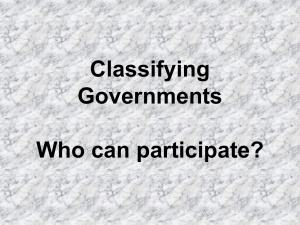
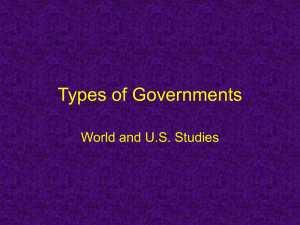
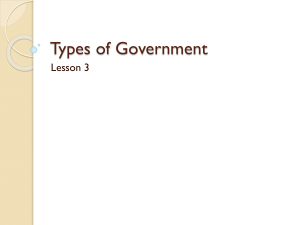
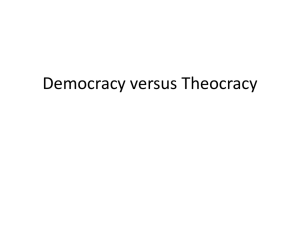
![“The Progress of invention is really a threat [to monarchy]. Whenever](http://s2.studylib.net/store/data/005328855_1-dcf2226918c1b7efad661cb19485529d-300x300.png)
